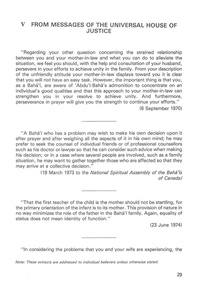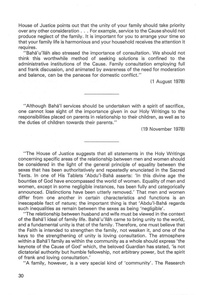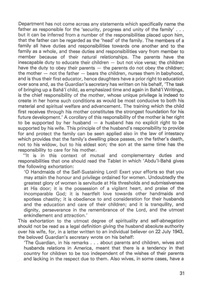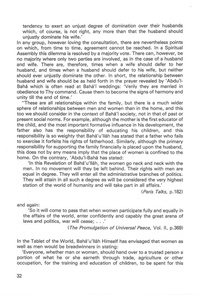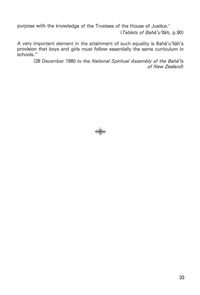Family Life/From Messages of the Universal House of Justice
The text below this notice was generated by a computer, it still needs to be checked for errors and corrected. If you would like to help, view the original document by clicking the PDF scans along the right side of the page. Click the edit button at the top of this page (notepad and pencil icon) or press Alt+Shift+E to begin making changes. When you are done press "Save changes" at the bottom of the page. |
V_ FROM MESSAGES OF THE UNIVERSAL HOUSE OF JUSTICE
“Regarding your other question concerning the strained relationship between you and your mother-in-law and what you can do to alleviate the situation, we feel you should, with the help and consultation of your husband, persevere in your efforts to achieve unity in the family. From your description of the unfriendly attitude your mother-in-law displays toward you it is clear that you will not have an easy task. However, the important thing is that you, as a Baha’i, are aware of ‘Abdu’l-Baha’s admonition to concentrate on an individual’s good qualities and that this approach to your mother-in-law can strengthen you in your resolve to achieve unity. And furthermore, perseverance in prayer will give you the strength to continue your efforts.”
(6 September 1970)
“A Baha'i who has a problem may wish to make his own decision upon it after prayer and after weighing all the aspects of it in his own mind; he may prefer to seek the counsel of individual friends or of professional counsellors such as his doctor or lawyer so that he can consider such advice when making his decision; or in a case where several people are involved, such as a family situation, he may want to gather together those who are affected so that they may arrive at a collective decision.”
(19 March 1973 to the National Spiritual Assembly of the Baha’is of Canada)
“That the first teacher of the child is the mother should not be startling, for the primary orientation of the infant is to its mother. This provision of nature in no way minimizes the role of the father in the Baha’i family. Again, equality of status does not mean identity of function.”
(23 June 1974)
“In considering the problems that you and your wife are experiencing, the Note: These extracts are addressed to individual believers unless otherwise stated.
29
House of Justice points out that the unity of your family should take priority over any other consideration . . . For example, service to the Cause should not produce neglect of the family. It is important for you to arrange your time so that your family life is harmonious and your household receives the attention it requires.
“‘Baha’u'llah also stressed the importance of consultation. We should not think this worthwhile method of seeking solutions is confined to the administrative institutions of the Cause. Family consultation employing full and frank discussion, and animated by awareness of the need for moderation and balance, can be the panacea for domestic conflict.”
(1 August 1978)
“Although Baha’i services should be undertaken with a spirit of sacrifice, one cannot lose sight of the importance given in our Holy Writings to the responsibilities placed on parents in relationship to their children, as well as to the duties of children towards their parents.”’
(19 November 1978)
“The House of Justice suggests that all statements in the Holy Writings concerning specific areas of the relationship between men and women should be considered in the light of the general principle of equality between the sexes that has been authoritatively and repeatedly enunciated in the Sacred Texts. In one of His Tablets ‘Abdu’l-Baha asserts: ‘In this divine age the bounties of God have encompassed the world of women. Equality of men and women, except in some negligible instances, has been fully and categorically announced. Distinctions have been utterly removed.’ That men and women differ from one another in certain characteristics and functions is an inescapable fact of nature; the important thing is that ‘Abdu’l-Baha regards such inequalities as remain between the sexes as being ‘negligible’.
“The relationship between husband and wife must be viewed in the context of the Baha’i ideal of family life. Baha’u’ll4h came to bring unity to the world, and a fundamental unity is that of the family. Therefore, one must believe that the Faith is intended to strengthen the family, not weaken it, and one of the keys to the strengthening of unity is loving consultation. The atmosphere within a Baha'i family as within the community as a whole should express ‘the keynote of the Cause of God’ which, the beloved Guardian has stated, ‘is not dictatorial authority but humble fellowship, not arbitrary power, but the spirit of frank and loving consultation.’
“A family, however, is a very special kind of ‘community’. The Research
30
Department has not come across any statements which specifically name the father as responsible for the ‘security, progress and unity of the family’... but it can be inferred from a number of the responsibilities placed upon him, that the father can be regarded as the ‘head’ of the family. The members of a family all have duties and responsibilities towards one another and to the family as a whole, and these duties and responsibilities vary from member to member because of their natural relationships. The parents have the inescapable duty to educate their children — but not vice versa; the children have the duty to obey their parents — the parents do not obey the children; the mother — not the father — bears the children, nurses them in babyhood, and is thus their first educator, hence daughters have a prior right to education over sons and, as the Guardian's secretary has written on his behalf, ‘The task of bringing up a Baha’i child, as emphasized time and again in Baha’i Writings, is the chief responsibility of the mother, whose unique privilege is indeed to create in her home such conditions as would be most conducive to both his material and spiritual welfare and advancement. The training which the child first receives through his mother constitutes the strongest foundation for his future development.’ A corollary of this responsibility of the mother is her right to be supported by her husband — a husband has no explicit right to be supported by his wife. This principle of the husband's responsibility to provide for and protect the family can be seen applied also in the law of intestacy which provides that the family’s dwelling place passes, on the father’s death, not to his widow, but to his eldest son; the son at the same time has the responsibility to care for his mother.
“It is in this context of mutual and complementary duties and responsibilities that one should read the Tablet in which ‘Abdu’l-Baha gives the following exhortation:
‘O Handmaids of the Self-Sustaining Lord! Exert your efforts so that you
may attain the honour and privilege ordained for women. Undoubtedly the
greatest glory of women is servitude at His thresholds and submissiveness at His door; it is the possession of a vigilant heart, and praise of the incomparable God; it is heartfelt love towards other handmaids and spotless chastity; it is obedience to and consideration for their husbands and the education and care of their children; and it is tranquility, and dignity, perseverance in the remembrance of the Lord, and the utmost enkindlement and attraction.’ This exhortation to the utmost degree of spirituality and self-abnegation should not be read as a legal definition giving the husband absolute authority over his wife, for, in a letter written to an individual believer on 22 July 1943, the beloved Guardian’s secretary wrote on his behalf:
‘The Guardian, in his remarks . . . about parents and children, wives and
husbands relations in America, meant that there is a tendency in that
country for children to be too independent of the wishes of their parents
and lacking in the respect due to them. Also wives, in some cases, have a
31
tendency to exert an unjust degree of domination over their husbands which, of course, is not right, any more than that the husband should unjustly dominate his wife.’
In any group, however loving the consultation, there are nevertheless points on which, from time to time, agreement cannot be reached. In a Spiritual Assembly this dilemma is resolved by a majority vote. There can, however, be no majority where only two parties are involved, as in the case of a husband and wife. There are, therefore, times when a wife should defer to her husband, and times when a husband should defer to his wife, but neither should ever unjustly dominate the other. In short, the relationship between husband and wife should be as held forth in the prayer revealed by ‘Abdu’I- Baha which is often read at Baha'i weddings: ‘Verily they are married in obedience to Thy command. Cause them to become the signs of harmony and unity till the end of time.’
“These are all relationships within the family, but there is a much wider sphere of relationships between men and women than in the home, and this too we should consider in the context of Baha’i society, not in that of past or present social norms. For example, although the mother is the first educator of the child, and the most important formative influence in his development, the father also has the responsibility of educating his children, and this responsibility is so weighty that Baha’u’ll4h has stated that a father who fails to exercise it forfeits his rights of fatherhood. Similarly, although the primary responsibility for supporting the family financially is placed upon the husband, this does not by any means imply that the place of women is confined to the home. On the contrary, ‘Abdu’l-Baha has stated:
‘In this Revelation of Baha’u’lla4h, the women go neck and neck with the men. In no movement will they be left behind. Their rights with men are equal in degree. They will enter all the administrative branches of politics. They will attain in all such a degree as will be considered the very highest station of the world of humanity and will take part in all affairs.’
(Paris Talks, p.182)
and again: ‘So it will come to pass that when women participate fully and equally in the affairs of the world, enter confidently and capably the great arena of laws and politics, war will cease; .. .’
(The Promulgation of Universal Peace, Vol. ||, p.369)
In the Tablet of the World, Baha’u'llah Himself has envisaged that women as well as men would be breadwinners in stating:
‘Everyone, whether man or woman, should hand over to a trusted person a portion of what he or she earneth through trade, agriculture or other occupation, for the training and education of children, to be spent for this
32
purpose with the knowledge of the Trustees of the House of Justice.’ (Tablets of Bahé‘u'lléh, p.90)
A very important element in the attainment of such equality is Baha’u'llah’s
provision that boys and girls must follow essentially the same curriculum in schools.”
(28 December 1980 to the National Spiritual Assembly of the Baha'is
of New Zealand)
